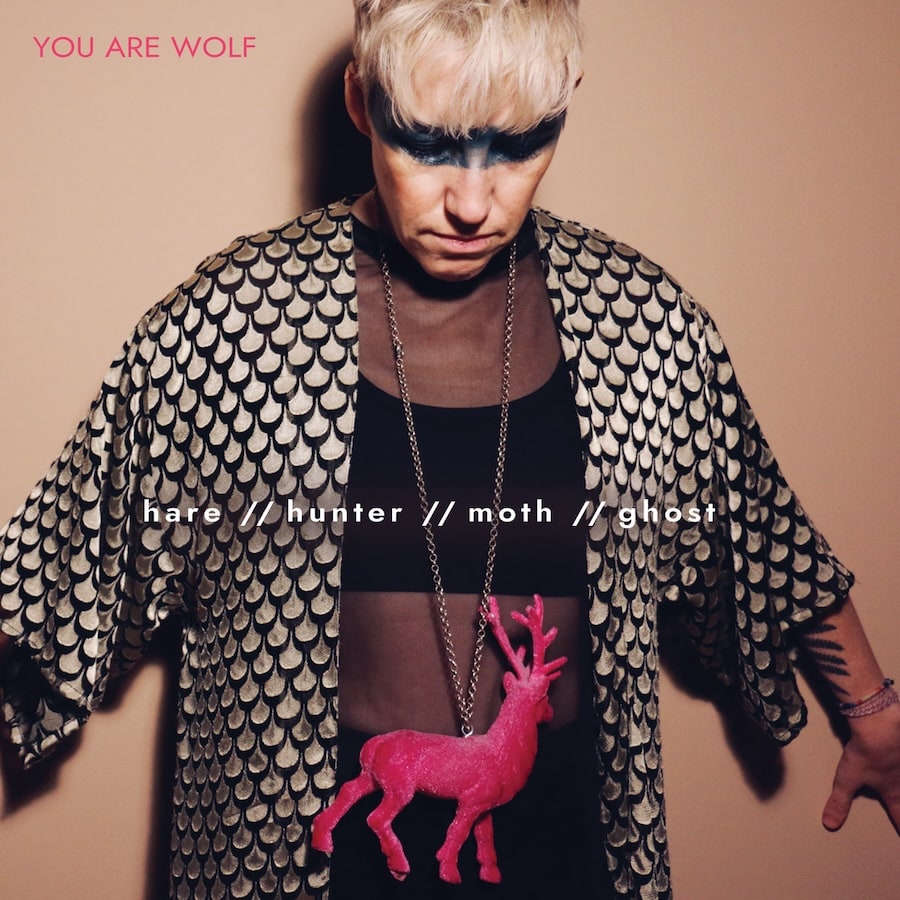
Not everybody has the ability to turn hardship and suffering into something beautiful because not all hardships are the same, and some forms of suffering are resistant to art. But sometimes, it is possible to turn the tables; sometimes, an act of creation can hold a convex mirror up to pain and, through a process that is mysterious or almost alchemical, produce a piece of creative and personal importance. Often, grief is the catalyst – see the recent Julie Byrne album or some of the best bits of Sufjan Stevens’ oeuvre – but other life-changing events can have an effect too. In the case of You Are Wolf – the nom de plume of author/singer/composer Kerry Andrew – the causes are more varied and complex: in 2018, they developed chronic fatigue syndrome, and more recently, they came out as non-binary. Both of these events inform their latest album, hare // hunter // moth // ghost, which uses traditional song and experimental composition to examine physical and spiritual transformation and the limits of the human body.
Andrew has been performing under the You Are Wolf moniker since 2011, and in that time, has also published three critically acclaimed novels, and she uses her gift for narrative to craft soundscapes that unfold like stories. Opener Reynardine begins in a comparatively traditional manner – Andrew’s voice is clear and high in the mix, and the plucked strings are graceful, almost sedate. But the stirrings of electronic experimentation are never far below the surface, and they come to the fore as the song draws to its conclusion. The influences of dark ambient, alt-folk and even industrial music are palpable. The song is transformation in action, which is very appropriate to Andrew’s preoccupations. And, of course, it is a song about a man who is actually a fox – a striking metaphor for how our bodies make for extremely fluid and imprecise boundaries.
Twa Magicians is another song about corporeal shapeshifting. Though most variants of the song depict an unhealthily coercive sexual relationship – a woman changes into various animate and inanimate objects in order to escape the advances of a blacksmith who eventually wears her down with his own magic – Andrew adapts the lyrics to create something that celebrates queer desire. Folk music is, amongst other things, endlessly malleable, and Andrew uses that malleability to great effect.
The first of the album’s four original songs, Winter Solstice, takes its lyrics from Kerri ní Dochartaigh’s memoir Thin Places. Where many of this album’s songs are concerned with the blurred boundaries of body, sexuality and gender, this one extends the theme to the boundary between the natural and the supernatural, between life and death. It has a chilly, twinkling feel, all expansive piano chords, frosty electronics and breathy vocals. There are elements of Kate Bush and Björk, but also David Tibet, Julia Holter and perhaps even Aphex Twin’s slower, sparklier moments. It is followed by two other originals: the delightful, music-box-perfect Hare Song 1, which unfolds like an incantation and features Andrew’s delicate, beautiful kalimba, and Herne/The Abbots Bromley Horn Dance, which takes its lyrics from Nick Hayes’ Book of Trespass and features singer/writer/activist Sam Lee on lead vocals. It feels ancient and bewitched and contains elements of Britain’s oldest folk dance.
One of many things that sets hare // hunter // moth // ghost apart from most other albums of predominantly traditional music is Kerry Andrew’s apparently natural gift for creating detailed musical landscapes using a wide variety of instruments and techniques, some of which come from the more experimental fields of modern composition. So on Girl As Wolf, based on a blood-stained and werewolf-haunted Danish folk song, they base the whole thing on a sumptuous bed of vibraphone and marimba, played by Peter Ashwell. On Hare Song 2, their piano is layered and processed until it becomes otherworldly. This experimentalism is never frivolous – it is always done in service to the song, which in this case is an actual spell recounted by Isobel Gowdie at her witchcraft trial in 1622.
Other experimental techniques include field recording – the birdsong that replaces music in the sweet, a cappella The Trees In The Wood – while Andrew’s pet cat Tyger is credited as a vocalist on the dark and doomy King Henry, a ballad well-known for its violence and spookiness. Here as elsewhere, Andrew imbues the song with further depth and complexity, both with their musical invention and their willingness to adapt the song in a way that teases out its queer overtones. Even the simplest and most unadorned songs are quietly innovative. I’ll Weave My Love A Garland is defined by its minimal, deft piano arrangement, but the chorus is buoyed up by a gentle background swell, and the sheer sense of care, love and attention is truly touching.
The final track, Blue Men, provides what might be the album’s experimental high point, adapting some new lyrics by nature writer Robert Macfarlane and backing them up with – amongst other things – a drone created by an electric heater. The song is sung from the point of view of the mythical Blue Men of the Minch, kelpies who are said to cause storms and capsize boats. There is a beguiling, whispered intro, some dramatic backing vocals and a melodic final section that is darkly, disarmingly beautiful. It’s a song that is full of strange components perfectly aligned, and that might be the key to the whole album: Andrew is masterful when it comes to this kind of alchemy; they can turn small or rough or difficult things into moments of bright wonder. In You Are Wolf’s hands, transformation is a gift to be celebrated.
hare // hunter // moth // ghost is available digitally and in a 300-copy limited edition CD release at: https://youarewolf.bandcamp.com/album/hare-hunter-moth-ghost
